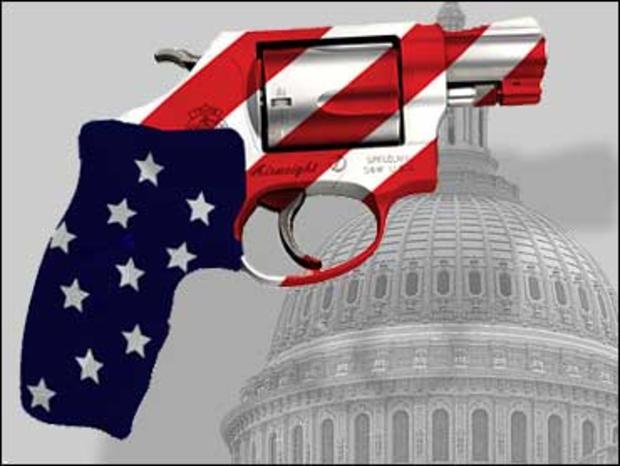NRA Deal on Campaign Finance Bill Angers Liberals and Conservatives
Updated 6:08 p.m. Eastern Time
On Monday, news broke that House Democrats had brokered a deal with the National Rifle Association to get the powerful gun lobbying group to drop its opposition to a piece of legislation designed to address the Supreme Court's controversial Citizen's United decision allowing corporations and unions to spend unlimited amounts of money on campaign advertizing.
Democrats, including President Obama, widely condemned the decision as opening the door to manipulation of elections on the part of domestic and foreign corporations. The legislation crafted to address it - known as the DISCLOSE act, and proposed by Rep. Chris Van Hollen (D-Md.) in the House and Chuck Schumer (D-NY) in the Senate - mandates that the corporations and unions spending on campaigns and running political advertising publicly identify top donors and related information.
The proposed deal announced Monday exempts from such requirement groups with more than one million members and no more than 15 percent corporate funding who don't pay for political activity with corporate funds, among other requirements. That's a category that the NRA, and perhaps no other group, falls into. The NRA reportedly agreed to drop its opposition to the legislation in exchange for the exemption.
Some liberal groups, including Public Citizen and the League of Women Voters, said they grudgingly accepted the deal as a necessary evil to get the bill passed, as the Washington Post reports. Others, including the Sierra Club and Public Interest Research Group, opposed it. They argue that it is unacceptable to exempt from the bill the powerful gun lobby, which hundreds of lawmakers - including dozens of Democrats - are careful almost never to cross.
One of the primary arguments of critics is that the NRA will become a pass-through for corporate money meant to take down Democrats - "a magnet for up to $87 million of new corporate funds to funnel into the system through its coffers," as Progressive Future's Adam Lioz put it.
NRA spokesman Andrew Arulanandam told Politico's Ben Smith that such arguments are "BUNK."
"The language of the exemption says that we can't spend any corporate revenue on campaign activity," he said.
Lioz counters that the NRA will get around this problem with "the wink and the nod."
"Corporations can give general revenue funds which will then free up NRA's copious individual donor money from their 4+ million members for spending on elections--money they would not have otherwise spent," he writes.
Perhaps unsurprisingly, since Republicans largely oppose the legislation, criticism of the apparent deal isn't confined to the left. For conservatives, the deal represents a decision to "sell out to Democrats on the First Amendment," as the Wall Street Journal editorial page put it in a rare break with the NRA.
"NRA members may soon regret the organization's bid to ingratiate itself with Democrats at the expense of its longtime free-speech allies," the newspaper argued.
Senate Minority Leader Mitch McConnell (R-Ky.), meanwhile, put out a statement attacking "the backroom dealing to win the vote of organizations with power and influence at the expense of everyone else."
That's one argument both sides are grabbing onto despite their divergent agendas.
"I know reform legislation is as strong as its weakest, smallest loophole, and this is a huge one," Ellen Miller, executive director of the Sunlight Foundation, told the Huffington Post. "Of all of the distasteful moments in inside-the-beltway sausage-making, this one has to take the cake."
Van Hollen told HuffPo the deal is worth it if it means the bill's passage.
If it does not pass, he said, "what would happen is that corporations could dump millions of dollars into campaigns without revealing their identity and hiding behind sham organizations and dummy corporations."
"We believe voters have the right to know who is spending this money because there are lots of organizations who hide behind nice-sounding names, like Americans for Clean Oceans funded by BP," he said.
That comment prompted House Republican Whip Eric Cantor (R-Va.) to accuse Van Hollen of a "callous" attempt to "use the crisis in the Gulf" to pass a bill "to sway the November election in the Democrats' favor."
Van Hollen spokesman Doug Thornell countered that Cantor is trying "to manufacture some bogus controversy by expressing phony outrage to distract from his indefensible position of standing with powerful special interests that are trying to purchase our democracy."
